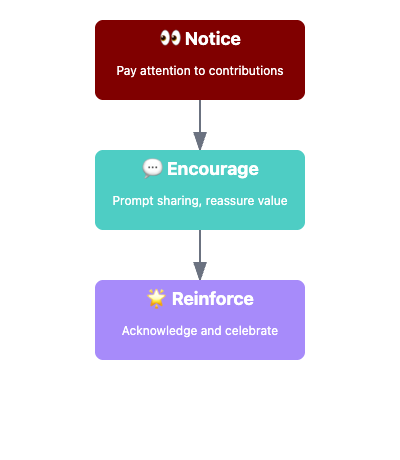Leadership is about inspiring others to grow, contribute, and thrive. When you lead with positivity and support, you help your peers feel empowered to take initiative and make a difference. Think of yourself as a catalyst: your actions and attitude set the tone for a motivated, resilient team.
Here’s how to lead your peers through positive influence:
- Foster a supportive, solutions-focused team culture by highlighting wins, encouraging optimism, and helping the team focus on what’s possible.
- Lead by example with organized, efficient project management — share your planning methods, keep priorities clear, and demonstrate follow-through.
- Encourage growth in others by mentoring, sharing knowledge, and modeling professional development.
By the end of this lesson, you’ll discover practical ways to lead through positive influence like in the examples above.
Leadership is about moving the team forward, supporting each other, and making a positive impact. Inspire positivity and productivity by fostering a supportive, solutions-focused culture and leading by example. This approach encourages everyone to contribute, learn, and grow together.
Try This:
- When someone spots a challenge, respond with support and optimism: “If you notice something we could improve, let’s talk about it and find a solution together. Leadership is about helping each other move forward.”
- Recognize and highlight when teammates take positive, solutions-focused actions, no matter their role: “I noticed you suggested a new way to organize our files—it’s already making things easier for everyone. That kind of initiative really helps our team grow.”
Let's look at how this plays out in a real conversation:
- Jessica: Hey Chris, I noticed you seemed a bit frustrated after the sprint review. Want to talk about it?
- Chris: Yeah, I’m just disappointed we missed the feature deadline again. It feels like we’re losing momentum.
- Jessica: I get it. Missing deadlines is tough. But I really appreciate how you flagged the blockers early. Let’s look at what slowed us down and see what we can adjust for next time.
- Chris: Thanks, Jessica. I think we could use a clearer daily task list. Sometimes I lose track of priorities.
- Jessica: That’s a great idea. I’ve found that using a daily task list helps me stay focused. Do you want to try setting one up together for the next sprint?
- Chris: I’d like that. Thanks for helping me turn this around.
Notice how Jessica acknowledges Chris’s frustration, focuses on solutions, and offers practical support. She models accountability and encourages growth, helping Chris regain motivation and confidence.
Empowering your peers to take initiative is one of the most valuable things you can do. Let them know their voice matters, and that even small actions can shape the team’s success.
A helpful method here is the “Notice, Encourage, Reinforce” approach:

- Notice: Pay attention to your peers’ contributions, ideas, or efforts, even if they’re small or tentative.
- “I noticed you had some great thoughts after our last meeting.”
- Encourage: Prompt them to share or build on their ideas, and reassure them that their input is valuable.
- “Next time, try sharing one with the group. Your perspective could really help us.”
- Reinforce: Acknowledge and celebrate when they take initiative, reinforcing that their actions make a difference.
- “Thanks for stepping up and sharing your idea. That’s exactly the kind of initiative that helps our team grow.”
Using this method helps create an environment where everyone feels empowered to contribute, speak up, and develop their leadership skills.
By leading in these ways, you help them build confidence, foster a team environment, and contribute meaningfully. Next, you’ll get to practice these skills in real-world scenarios by helping a teammate regain motivation, structuring a project sprint, and mentoring a new project coordinator.
